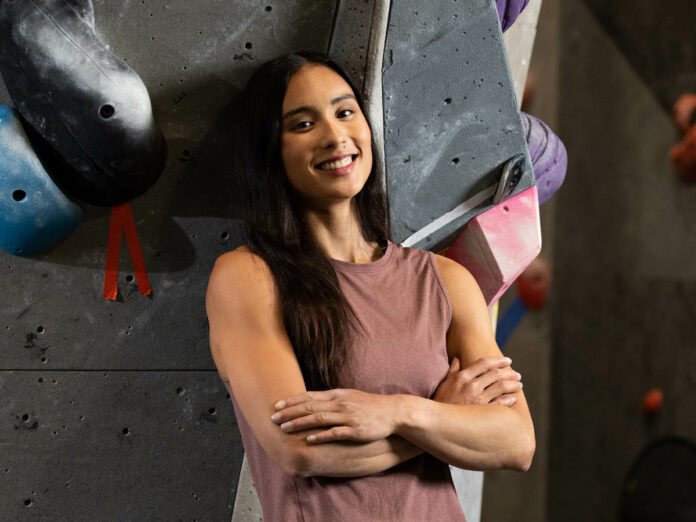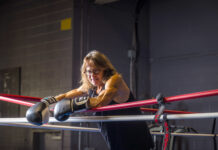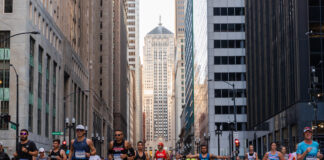
If you can imagine scaling a sheer rock wall like Spiderman, you know what it’s like to be superstar Canadian rock climber, Alannah Yip. She regularly ascends rock walls that look impossibly difficult to most people with only tiny flakes of stone to grasp and stand on. And now, she’s made history by climbing her way onto the first ever Canadian Olympic Sport Climbing team.
But her journey to success wasn’t easy. Fraught with disappointment during qualifying competitions, it was Yip’s control, talent and ultimately champion mind-set that propelled her up the wall to victory.
In February, with one day of competition to go, Yip knew she had to win the finals at the Pan Am Games in Los Angeles to secure the only female spot on Canada’s first ever Olympic sport climbing team. It was the third and final Olympic qualifier and the six-time Canadian National champion knew it was her last chance. To add even more pressure, only the winners of the competition would qualify. Coming second wouldn’t.
“I was the favourite going in and knew I had a good chance of winning,” says Yip, 26. “I decided to save everything for the last day.”
The first day of competition all Yip had to do was qualify to move to the semi-finals. In the semis, she climbed hard enough to make finals without giving it her all.
“I wasn’t climbing at 100 per cent the first two days. It was kind of my way of relaxing and stepping back to put less pressure on myself. But after the first two days I was a bit of a mess and freaking out! I had to remind myself that this was the plan.”
For the final event – lead climbing – Yip said she was nervous but under control. She says she really tapped into her logical side for the last climb, scanning the route and planning what she would do just before ascending.
“I wanted to climb as well as I could without making a stupid mistake!” She laughed.
Watching Yip ascend the final climb of the competition was like watching an effortless flow of water. She moved smoothly and progressively upwards with her hands and feet placed precisely as she ascended higher and higher making a mockery of the difficulty level. In the end, she climbed higher on the route than any other female climber and won the competition, securing her place on the Olympic team and in the history books.

Yip’s road to the Olympics began as a six-year old, as she tried to keep up with Sean and Jason McColl – the sons of close family friends.
“I really looked up to them and wanted to do what they were doing, even though they were six and eight years older,” laughs Yip. “They were kind of like cousins to me and still are. When they started to climb, so did I. But I also fell in love with the sport.”
She began at a gym called The Edge (now Climb Base5) where she still climbs – a facility that has created a disproportionate number of Canadian elite climbers over the years.
Yip and Sean McColl have both excelled in climbing with McColl currently ranked third in the world and taking a spot on the Canadian Olympic team. They both compete regularly on the International Federation of Sports Climbing circuit and on World Cup circuits.
“Climbing is a mental and physical challenge,” explains Yip. “That’s what I love about it. I’m an analytical person – I have a degree in mechanical engineering so that should tell you something!’
Another thing she likes about the sport is how individual it is. Two climbers can both climb the same route in completely different ways. Yip says it all depends on your body – height, weight, flexibility, strength and mobility can all impact how you climb.
Climbing competitions are made up of three events: speed climbing, bouldering and lead climbing. Yip says speed climbing is like vertical sprinting. The other events are more about precision, strength and flexibility although they both have a time limit. (See info at the bottom of this page for details.)
Elite climbers like Yip require a combination of athleticism, flexibility, strength and daring to excel. These are things Yip works on regularly through a program of strength and flexibility training, and climbing. Clayton Cross is her strength training coach while Andrew Wilson is her climbing coach. Yip has been with Wilson since she was a youth climber and he is also the coach of the Canadian Olympic team.
“For strength training, Clayton looks at videos of me climbing to see what I need to work on,” says Yip. “We focus on upper body and core strength and emphasize increasing stability at extended positions. We also do a lot of work on hip extensions.”
Grip strength is huge for climbers and Yip works out on a finger board, clinging to near impossible ledges to increase strength and endurance in the small muscles of her hands, fingers and forearms. This is good practice for the routes she climbs, some of which have ledges less than 1/4 inch wide for hands and feet.

Alannah Yip’s World Championship Rankings
| Discipline | 2016 | 2018 | 2019 |
| Bouldering | 16 | 13 | 7 |
| Lead Climbing | 43 | 51 | 38 |
| Speed Climbing | 38 | 37 | 29 |
| Total Climbing | N/A | 15 | 18 |
Competing since she was a young girl, Yip has learned how to get into the right mind set.
“I’m able to stay calm when it matters,” she says, “and I climb best when I stay level-headed and don’t get emotional. If I fall, I try to think logically and ask myself ‘What happened? What could I do better next time?’ I think a lot of my competition mindset is because of my own personality. I’m not a very emotional person.”
While Yip says she gets ‘super nervous’ before an event, she works on not getting too attached to the outcome. Climbing is not who I am, it’s what I do, she says. Adopting that philosophy has let her accept that she won’t win every time and that losing is okay. It’s doing your best that counts the most.
Making the Olympic team and then having the Games postponed didn’t throw Yip at all, in fact she sees it as a positive.
“I qualified late in the season and some climbers qualified last summer! The postponement gives me a year to catch up on my training and be ready. It is also a bit of a relief not having to be training for the Olympics during the COVID-19 pandemic. This way I can relax, stay home and be safe.”
With the pressure of the Games off, Yip has taken the opportunity to expand her interest into other sports like backcountry skiing and mountain biking.
“It’s nice to be able to do a sport for enjoyment only, not performance,” she says. “And it’s fun being a beginner again.”
Currently, Yip is working at Climb Base5 as a youth climbing coach and setter, creating new routes for gym goers. In addition to climbing and training – indoors and out – Yip is spending her time hanging out and hiking with family and friends. She loves cooking and reading and hopes someday to put her engineering degree to use. She’s also doing Instagram workouts for Olympic sponsor Airbnb. Her classes focus on mobility, flexibility, grip strength and visualization.
And while she’s climbed all over the world from Spain and Switzerland to South Africa, her favourite place to climb is right in her own backyard at Squamish, B.C.
“Why wouldn’t I love it there?” She says, “It’s world-class climbing!”
Competition Climbing Primer
Here’s a detailed explanation of the three events in a climbing competition taken from the Canadian Olympic website: https://olympic.ca/sports/sport-climbing/
Sport climbing will make its Olympic debut at Tokyo 2020. Three disciplines – speed climbing, bouldering, and lead climbing – will be included in a combined event, contested in that order. Twenty athletes of each gender will compete in the qualification round, with six competitors advancing to the final round on a separate day.
Speed Climbing
In speed climbing, competitors race two at a time to scale a fixed route on a 15-metre high wall set at a 95-degree angle. To begin, climbers are secured with safety ropes and, upon the starter’s command, have four seconds to place both hands and one foot on their preferred starting holds. The timing system sounds three beeps, the last of a higher pitch that signals the climbers to start. While reaction time is key, a false start will result in disqualification. At the top, they hit a timing pad with their hand to stop the clock. The quickest men will usually finish in five to six seconds while winning times for women tend to be seven or eight seconds.
Note: Alannah Yip’s personal best (and Canadian women’s speed climbing record) is 9.509 seconds. The women’s world record is 7.101 seconds, set by YiLing Song of China in 2019.
Bouldering
In bouldering, competitors scale as many fixed routes on a four-metre wall as they can within a four-minute time limit at each boulder. The routes have varied levels of difficulty, with a maximum of 12 handholds but usually between four and eight. At no time is a climber more than three metres above a landing mat, so no safety ropes are required. Climbers can try a route again if they fall during their initial attempt. A route is completed when the climber grabs the final hold with both hands. Among the challenges in bouldering are the overhangs and holds so small that climbers can rely only on their fingertips.
Lead Climbing
In lead climbing, competitors scale as high as they can on a wall that is at least 15 metres high and three metres wide within a six-minute time limit. Climbers are secured with safety ropes that they attach to quickdraws at various protection points along the route. The climb is complete when the rope is attached to the top quickdraw on the wall. A climber has only one attempt, so if they fall, the height they reached is recorded. If multiple athletes complete the climb or reach the same height, speed comes into play to determine the results.
Photos by Ronald Lee
 IMPACT Magazine’s Special Summer Edition
IMPACT Magazine’s Special Summer Edition
This has not been a regular summer, and this is not a regular edition of IMPACT Magazine. In fact, it is an unprecedented issue that comes to you as a result of true grit and community support.
















